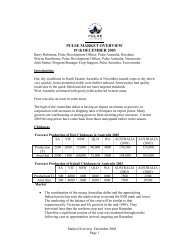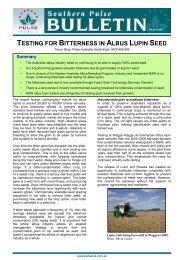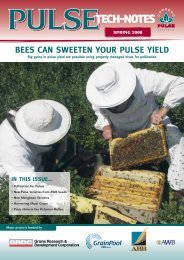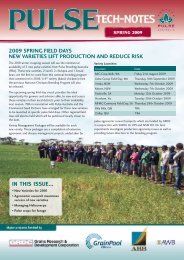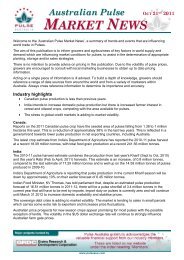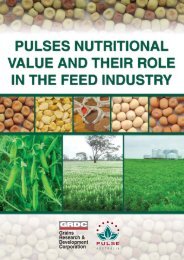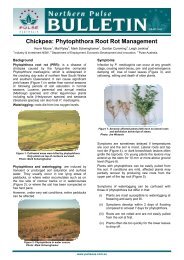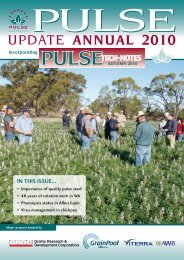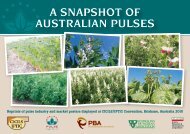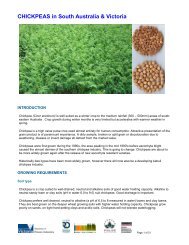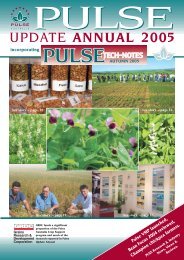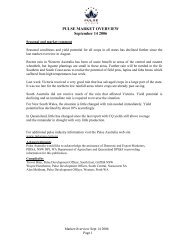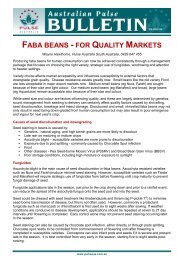Australian Grain Industry Code of Practice - Pulse Australia
Australian Grain Industry Code of Practice - Pulse Australia
Australian Grain Industry Code of Practice - Pulse Australia
Create successful ePaper yourself
Turn your PDF publications into a flip-book with our unique Google optimized e-Paper software.
Contract No. 4 for <strong>Grain</strong>/Oilseeds/Birdseeds and <strong>Pulse</strong>s in<br />
containers Delivered Container Terminal (DCT)<br />
This contract is used by grain sellers who pack and then<br />
deliver containerised grain for domestic or international<br />
shipping. Title in the grain transfers upon receipt <strong>of</strong> the<br />
packed container in the container terminal yard.<br />
Storage & Handling Agreement<br />
This agreement can be used by grain growers who are<br />
warehousing grain and the warehouse does not have an<br />
agreement. This agreement has clauses dealing with grain<br />
title and insolvency <strong>of</strong> the relevant warehouse.<br />
Bulk Freight Contract<br />
Designed to enforce contractual obligations on both the<br />
consignee and consignor in relation to the bulk movement<br />
<strong>of</strong> grain particularly by road transport. This contract should<br />
be utilised in conjunction with the <strong>Code</strong> <strong>of</strong> <strong>Practice</strong> developed<br />
by GTA in conjunction with the Livestock and Bulk Carriers<br />
Association.<br />
Buyers may <strong>of</strong>fer a range <strong>of</strong> grain contracts that may incorporate a<br />
range <strong>of</strong> features that increase the complexity <strong>of</strong> the contract and<br />
may or may not reference the use <strong>of</strong> derivative products or underlying<br />
futures markets or may be deemed a Financial Product as defined by<br />
the Financial Services Reform Act.<br />
Contracts that may fall under this category include (but are not<br />
limited to) commodity futures contracts, basis contracts, hedge to<br />
arrive contracts, futures first contracts, futures look-a-like contracts<br />
such as: swaps; bought and sold options on physical or futures<br />
markets; contracts dealing with foreign exchange; and contracts<br />
connected to a managed investment scheme.<br />
<strong>Industry</strong> participants considering utilising any <strong>of</strong> these types<br />
<strong>of</strong> contracts should ensure that they understand the nature <strong>of</strong><br />
the contract, its pricing characteristics, the risks in relation to<br />
the contract and under what circumstances and through what<br />
mechanism the original terms <strong>of</strong> the contract can be altered.<br />
Growers should clearly understand at the time <strong>of</strong> contracting<br />
what the implications are in the event <strong>of</strong> production difficulties<br />
and the inability to fulfil contract obligations due to reduced or<br />
failed production.<br />
GTA has produced a plain English guide – A Guide to Taking Out<br />
Contracts to Supply <strong>Grain</strong> – which can be downloaded from the GTA<br />
website. This Guide covers the major issues that growers need to be<br />
aware <strong>of</strong> when contracting grain. This is not a substitute to reading<br />
and understanding the terms and conditions <strong>of</strong> the contract.<br />
<strong><strong>Australia</strong>n</strong> <strong>Grain</strong> <strong>Industry</strong> <strong>Code</strong> <strong>of</strong> Conduct 19



